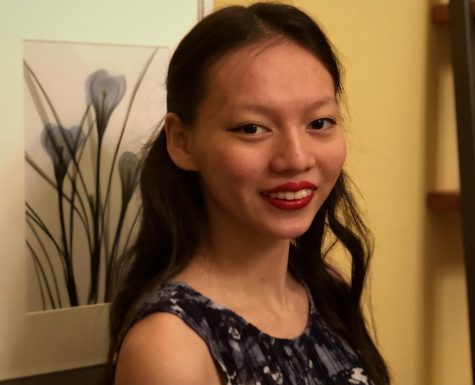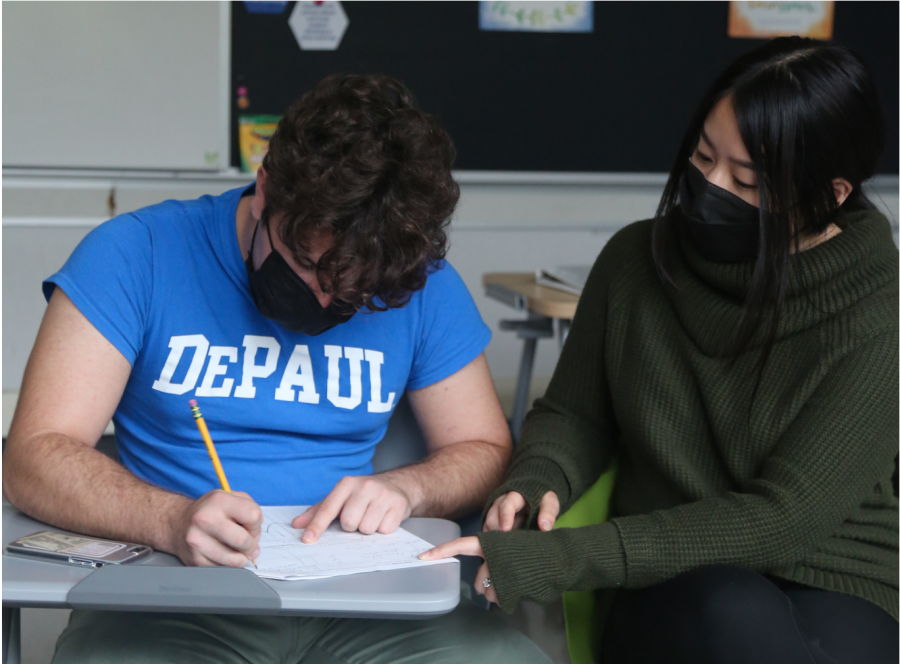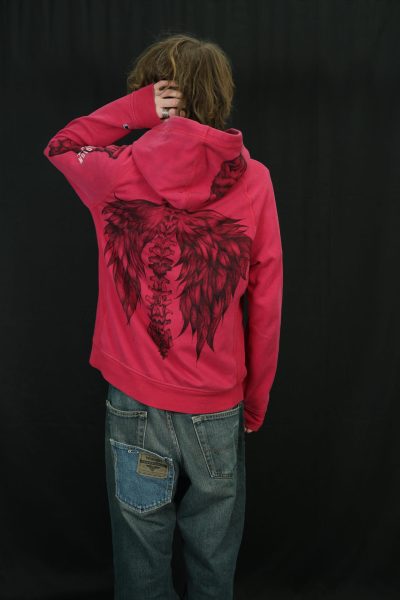A Thing with Feathers
Luciana Qu tutors a student after school. In the past, she has also struggled with math. “I think that not being good at math makes me an even better teacher because I understand what it feels like,” Qu said.
As a student at Huron High School, Luciana Qu struggled in math. Now, she teaches math at Community High School (CHS) in Room 322.
“I had a 3.3 GPA, which compared to my other Asian friends, was basically a death sentence,” Qu said. “There was a lot of stigma associated with being friends with me. People just thought that I was dumb.”
Qu was born in London, England, and, six years later, moved with her family to Ann Arbor; she has lived here ever since. Qu explains that being Asian in Ann Arbor is “a whole different story.” Qu grew up with parents that instilled values of Confucianism, which favors those who are academically elite. As such, she went on to college following the traditional mindset of becoming a doctor or surgeon: a path that she quickly learned was not for her.
“I did awful in college,” she said. “I ended up having a 2.7 GPA for the first three or four years because I was pursuing something I had to try so hard to even go to class for.” It took Qu seven years, from 2011 to 2018, to graduate from Michigan State University. However, when she graduated, she had a degree in a subject she was good at, interested in and passionate about.
“Throughout these seven years, I took two semesters off. After the second semester, I realized I was really good at tutoring,” Qu said. “[Michigan State University] has a lot of international students. The majority of them are from China.” Qu explained that, because of Ann Arbor Chinese school, she utilized being bilingual and tutored the international students.
“I really enjoyed tutoring and I realized that Michigan State University has the best School of Education [elementary and secondary] in the country, so why not try for that,” Qu said. “I applied, got in and I did really well. I pretty much 4.0’d the classes there.” With that degree, Qu went on to become an elementary teacher and taught for several years in Detroit, loving every minute of it. Yet, Qu felt like she could teach and support students in academic areas at a higher level than elementary school.
“My love was in math,” she said. “The reason for that is because I struggled a lot with math growing up. I got B’s and C’s in math.” Qu explains that the struggle that she had as a student, without much support in high school, now helps her understand and relate to her students.
“I think that not being good at math makes me an even better teacher because I understand what it feels like,” Qu said. “Making people realize that they can be good at math, when they’ve had a history of not being good at math is where the magic happens.”
Qu explains that after observing that sense of realization in her kindergarteners, she wanted to realize a similar trend at a more advanced level.
“I wanted to see that in older kids and with more difficult math,” Qu said. “These are students who have experience being taught by drill-driven math teachers and parents who are like, ‘Why can’t you get your grade up?’” Qu decided to pursue a master’s degree in secondary education, specifically in math, at the University of Michigan last year and was placed first at Clague Middle School and then at CHS.
At CHS, Qu bonded with a fellow math teacher and forum leader to which Qu was assigned: Maneesha Mankad. “[Her Zoom meetings] were completely eye-opening, especially with how energetic Maneesha was,” Qu said. “She’s so charismatic, and I think that she’s one of those sparks, like a mentor for life.”
Qu continues to explain what life was like as a student-teacher on Zoom and explained that of all the students that she saw, the ones that she remembered the most were the ones who had their camera on. “I think that, in a sense, Zoom was a window into how students felt,” Qu said. Qu wants to be there as a support for students like she wanted during her time as a student. “Being bad at math, and being a math teacher, helps me connect with the students and make sure that I’m counteracting the myth that Asians can’t be bad at school,” Qu says.
Through all of the obstacles, Qu persisted. A powerful poem, written by Emily Dickinson, has resonated with her as often as it has withstood time. “‘Hope is a Thing with Feathers’ is one of my favorite poems,” Qu said. “It encapsulates what hope is — and the definition resonates within me.” The poem reminds Qu of her roots and she explains that it is not there as a tenet for herself, but rather, “as a core part of why I do what I do.” Qu believes that the poem is not just a part of her but also encapsulates many teachers’ reasons for continuing to teach and educate many generations of students.
“Teaching is an idealistic profession. It perpetually tests the very core of every educator’s devotion to their teaching philosophy,” Qu said. “And without hope, I believe the essence of teaching is lost.”










